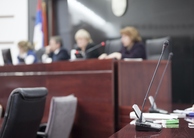Legally speaking, the victim of an accident caused by an air traffic controller may be an air operator (because it may incur economic loss if its aircraft is out if service after an accident or in case a flight is cancelled or delayed due to the negligent actions of an ATCO), a crew member, a passenger (in case of death, personal injury or damage or loss of luggage or other economic losses), the owner of the cargo being transported by air (in case cargo is destroyed after an accident or damaged because of a delay such as, for example, perishable goods), the owner of the aircraft destroyed or damaged, or third parties on the ground. Eurocontrol is the main provider of air navigation services in Europe. According to its revised constitution, any victim of an aviation accident or its descendants can sue Eurocontrol even if they are not a citizen of a member state of this organization.
Having in mind that the liability of ATCO’s derives usually from the law of tort, following an aviation accident, the competent court to adjudicate the case will generally be the courts of the country where the accident took place. In the rare cases where ANSP have a contractual relationship with the users of their services, the liability of these agencies will be clarified by the tribunals of the country where the contract was entered into.
If an accident is caused by an ATCO who is employed by the national agency of the state where the accident happened, then the law of this country will apply. Problems may occur if an accident takes place in a territory where air navigation services are provided either by a foreign ANSP or by an ASNP of another state but providing its services within the country where the accident occurred. In other words the question raised is weather in such a case the lex loci would be applied or the law of the defendant.
The court case following the mid air collision over the skies of Germany in 2002 that was mentioned previously was adjudicated in accordance to the lex loci principle. In other words, since the accident took place in the German State, the court’s decision was founded exclusively upon German law. It is important to note that in Germany only the State can be sued for the alleged negligence of its air traffic controllers. On 27 July 2006 a German court ruled that Germany remained responsible for the air navigation services provided in its territory even if it has delegated this task to the Swiss provider Skyguide. Germany was liable to pay damages to Bashkirian Airlines. Russia did not bring its claim in front of ICAO and the domestic court in Germany did not found its argument upon Article 28 of the Chicago Convention. It is important to note that until today ICAO never had to adjudicate any case between its Member States based upon the violation or the negligent performance of the provisions contained in Article 28.
To make things more complicated, there are also divergences between countries as to the type of court that will adjudicate these disputes. For example, in France, administrative tribunals will have jurisdiction because of the governmental status of the agency responsible for providing air navigation services, while in Switzerland the Supreme Court will hear the case. In the United States, actions against ATCO’s must be brought before district courts while in Germany civil courts will be competent to hear the case.
Domestic courts will decide the amount of damages that will be awarded to the victims. According to the UK Law Reform (Contributory Negligence) Act 1945, if it is proven after an accident that a pilot was contributory negligent, the courts in the UK will lessen the amount of damages awarded by a proportion reflecting the extend to which the pilot’s acts or omissions contributed to the damages. Some states in the US adopt a stricter approach in relation to contributory negligence by recognizing it as being a complete defense to negligence.
Acts of gross negligence can lead to criminal prosecutions. ATCO’s may be faced with charges of manslaughter depending on the criminal laws of each State. Indeed, a State can decide to criminally prosecute an air traffic controller for his actions and omissions that led to or contributed to an accident. Society at large and in particular the victims of aviation accidents or their descendants want ATCO’s and other aviation professionals to be held accountable for their part of responsibility leading to a crash.
As early as 1977, the International Federation of Air Traffic Controllers proclaimed that ‘’it can never support any controller who is guilty of a deliberate act which impairs air safety, not can IFATCA support any controller who is guilty of criminal negligence but the Federation must reserve the right to use any legal means available to it to protect any member who is accused of such crimes. IFACTA defines that it should be necessary to prove mens read beyond all reasonable doubt before a crime can exist. All other cases where mens rea cannot be proven must fall under Civil Law as opposed to Criminal Law’’.
After an aviation accident a technical investigation is conducted by the investigating body of the country where the disaster occurred, in accordance with the provisions of ICAO Annex 13 in order to determine what factors caused or contributed to the accident and put in place new measures in order to avoid the recurrence of such events. The purpose of Annex 13 is not to apportion blame or liability. The findings of the technical investigation are now used as a primary piece of evidence during litigations involving ATCO’s. This new trend is highly detrimental to the enhancement of aviation safety because ATCO’s may then be reluctant to supply relevant information to the investigating team. As a consequence the same mistakes are likely to be committed again. This goes against the philosophy of the Just Culture which tries to draw line between what is acceptable and non-acceptable behavior and according to which aviation professionals should only be punished for acts of gross negligence or willful misconduct and not for their unintentional errors or mishaps. The issue of criminalization of aviation professionals is dealt with in a very inconsistent manner all over the world and adds vagueness and confusion to the question of the liability of air traffic controllers. This trend will now be illustrated by briefly explaining the criminal prosecutions that were taken against ATCO’s after four different aviation accidents.
In 1976, two aircrafts collided in mid air over Zagreb in Croatia. One of the controllers on duty that day was convicted to seven years imprisonment for his negligence. On appeal, the Supreme Court reduced his sentence to three years and six months.
In 1997, a Ukrainian aircraft crashed in Thessaloniki during a missed approach. The technical investigation subsequently conducted in accordance with ICAO Annex 13 revealed that miscommunication between the ATCO’s and the pilots were a probable cause of the crash. During the trial following this accident, the ATCO’s were found guilty of manslaughter and were convicted to 5 years in prison.
In 2001, 118 persons died when two aircrafts collided on the runway. It was proven that the negligence of an ATCO had contributed to the disaster. As a result, he was sentenced to 8 years imprisonment.
In 2001, contradictory orders given a controller and resolution advisory commands given by a TCAS on board a Japanese aircraft led to a near midair collision. 42 passengers were injured. In 2008, the two controllers on duty at that time were convicted to a suspended prison sentence of 18 months for the first one and 12 months for the second.Continued on Next Page »
Books
Isabella Henrietta Philepina Diedriks-Verschoor, An introduction to Air Law, Kluwer Law International, 8th Edition, 2006.
Peter Haanappel, The Law and Policy of Outer Space – A Comparative Approach, Kluwer Law International, 2003.
Jiefang Huang, Aviation Safety Through the Rule of Law: ICAO’s Mechanisms and Practises, Kluwer Law International, 2009.
Francis Schubert, La responsabilité des agences du contrôle de la circulation aérienne, Lenticularis Opfikon, (1994).
Raymond C. Speciale, Fundamentals of Aviation Law, McGraw-Hill, 2006.
Erwin Von Den Steinen, National Interest and International Aviation, Kluwer Law International, 2006.
Sofia Michaelides-Mateou, Air Law: a Practical Perspective, Sakkoulas, 2010.
Sofia Michaelides-Mateou and Andreas Mateou, Flying in the Face of Criminalization, Ashgate, 2010
Articles
P.P. Flynn, Air Traffic Control Technology and Law, 2 Transportation Law Journal 249 (1970).
Helene Sasseville, ATC Agencies: Fault liability vs. Strict liability, 10 Annals of Air & Space Law. L.239 (1985).
International Legislation
Annex 2 to the Convention on International Civil Aviation 1944 (Rules of the Air), 10th Edition, (July 2005).
Annex 11 to the Convention on International Civil Aviation 1944 (Air Traffic Services), 13th Edition, (July 2001).
Annex 13 to the Convention on International Civil Aviation 1944 (Aircraft Accident and Incident Investigation), 10th Edition (July 2010).
Convention on Damage Caused by Foreign Aircraft to Third Parties on the Surface, signed at Rome on 7 October 1952, ICAO Doc 7364.
Convention on International Civil Aviation, signed at Chicago on 7 December 1944, ICAO Doc 7300/8, 9th Edition, (2006).
Convention for the Unification of Certain Rules Relating to International Carriage by Air, signed at Warsaw on 12 October 1929.
Convention for the Unification of Certain Rules Relating to International Carriage by Air, signed at Montreal on 28 May 1999, ICAO Doc 9740.
Procedures for Air Navigation Services Air Traffic Management, ICAO Doc. 4444 ATM/501, 15th Edition, (2007).
Protocol Consolidating the Eurocontrol International Convention Relating to Co-operation for the Safety of Air Navigation of 13 December 1960, as variously amended, signed at Brussels on 23 June 1997.
Treaty on Principles Governing the Activities of States in the Exploration and Use of Outer Space, including the Moon and Other Celestial Bodies, signed at London, Moscow and Washington on 27 January 1967. UN Doc 610 UNTS 205 / 6 ILM 386 (1967) / [1967] ATS 24.
US Legislation
FAA Flight Services Order JO 7110.65
Federal Tort Claims Act, 28 U.S.C. §§ 1346(b) 1944
US Cases
American Airlines v United States 418 F.2d at 197
Coateny v Beckshire 500 F.2d 290, 292 (8th Circuit 1974)
Dalehite v United States 346 V.S. 15 (1953)
Eastern Airlines v Union Trust 221 F.2d 62 Cir. (1955)
Harris v United States 333 F.Supp. 870 (N.D. Tex. 1971) at 873
Hartz v United States 387 F.2d at 873 (5th Circuit 1968)
Hopson v Gulf Oil Corp 150 Tex. 1, 237 S.W.2d 352 (1951)
lndian Towing v United States, 350 V.S. 61 (1955)
Ingham v Eastern Airlines, Inc221 F.2d 62 (D.C. Cir. 1955)
Johnson. Jensen. Christenson v. United States 6 Av. Cas. 18,111, 1960 V.S.C. Av. R. 269 (E.D. Mich. 1960)
Kelley v. U.S. No. 1:08cv31, March 20, 2009; USDC at Alexandria, Va. VLW 009-3-163, 33 pp
Marino v United States 84 F.Supp. 721 (E.D. New York 1949)
Sanbutch Properties v United States
Schuler v US868 F.2d 195 (1989)
Smerdon v United States 135 F.Supp. 929 (D.Mass. 1955)
Todd v United States 384 F.Supp. 1284, 1291; CCH Avi 17, 260; 17264.
United States v Union Trust 330 U.S. 907 (1955)
Websites
Aviation Safety Network. http://aviation-safety.net/database/record.php?id=20020701-0
Eurocontrol guidance notes for pilots (Rules for VFR flight). www.skybrary.aero/bookshelf/books/716.pdf
Eurocontrol. http://www.eurocontrol.int/articles/skills-required-be-air-traffic-controller
Indian Air Traffic Controllers. http://www.atcguild.com/tour/atctour02.asp
US Centennial of Flight Commission. http://www.centennialofflight.gov/essay/Government_Role/Intl_Civil/POL19.htm
Master Theses
Albert Kost, Responsibility and Liability for Air Navigation Services, Leiden University, 2004.
Mohamed Abdul Kader, Air Traffic Liability, Mg Gill University, 1986
Helene Sasseville, The Liability of Air traffic control agencies, McGill University, 1985.
Other Documents
Bashkirian Airlines v. Bundes republik Deutschland, (2006) with the District Court of Konstanz Case Number 4 O 234/05 (Fourth Chamber).
Private air law LLM reader 2011-2012. Course leader: Professor Mendes de Leon, Leiden University.
The Airports Authority of India (Amendment) Act, 2003 NO. 43 of 2003 [7th September, 2003], Section 33.
1.) Indian Air Traffic Controllers website http://www.atcguild.com/tour/atctour02.asp, last visited (18-10-2011).
2.) US Centennial of Flight Commission website http://www.centennialofflight.gov/essay/Government_Role/Intl_Civil/POL19.htm , last visited (17-10-2011).
3.) US Centennial of Flight Commission website http://centennialofflight.gov/essay/Government_Role/Air_traffic_control/POL15.htm , last visited (20-10-2011).
4.) Mohamed Abdul Kader, Air Traffic Liability 11-12 (Master Thesis at McGill University) (1986).
5.) Convention for the Unification of Certain Rules Relating to International Carriage by Air, signed at Warsaw on 12 October 1929. Hereafter referred to as the Warsaw Convention.
6.) Convention for the Unification of Certain Rules Relating to International Carriage by Air, signed at Montreal on 28 May 1999, ICAO Doc 9740. Hereafter referred to as the Montreal Convention.
7.) Convention on Damage Caused by Foreign Aircraft to Third Parties on the Surface, signed at Rome on 7 October 1952, ICAO Doc 7364. Hereafter referred to as the Rome Convention 1952.
8.) Convention on International Civil Aviation, signed at Chicago on 7 December 1944, ICAO Doc. 7300/8, 9th Edition, (2006). Hereafter referred to as the Chicago Convention.
9.) F. Schubert, La responsabilité des agences du contrôle de la circulation aérienne 1 (1994).
10.) Annex 11 to the Convention on International Civil Aviation 1944 (Air Traffic Services), 13th Edition, (July 2001).
11.) Eurocontrol website http://www.eurocontrol.int/articles/skills-required-be-air-traffic-controller , last visited (15-10-2011)
12.) Annex 2 to the Convention on International Civil Aviation 1944 (Rules of the Air), 10th Edition, (July 2005).
13.) Procedures for Air Navigation Services Air Traffic Management, ICAO Doc. 4444 ATM/501, 15th Edition, (2007).
14.) E. V. D. Steinen, National Interest and International Aviation 71 (2006).
15.) FAA Flight Services Order JO 7110.65
16.) I.H Diedriks-Verschoor, An introduction to Air Law 198 (2006).
17.) According to ICAO Doc 4444 PANS/ATM of November 2007, TCAS is an aircraft system based on secondary surveillance radar (SSR) transponder signals, which operates independently of ground-based equipment to provide advice to the pilot on potential conflicting aircraft that are equipped with SSR transponders.
18.) Aviation Safety Network website http://aviation-safety.net/database/record.php?id=20020701-0 , last visited (05-10-2011)
19.) Private Air Law reader 2011-2012 at 271. Course leader: Prof Mendes de Leon, Leiden University.
20.) Ibid at 272.
21.) See Kader, supra note 6, at 68.
22.) Federal Tort Claims Act, 28 U.S.C. §§ 1346(b).
23.) 346 U.S. 15 (1953)
24.) H. Sasseville, The Liability of Air traffic control agencies 66 (Master Thesis at McGill University) (1985).
25.) 330 U.S. 907 (1955)
26.) 221 F.2d 62 Cir. (1955)
27.) 350 V.S. 61 (1955)
28.) See supra note 19, at 271.
29.) See Steinen, supra note 14, at 70.
30.) A. Kost, Responsibility and Liability for Air Navigation Services 22 (Master Thesis at Leiden University) (2004)
31.) Ibid at 56-57.
32.) See Diedriks-Verschoor, supra note 16, at 190.
33.) The Airports Authority of India (Amendment) Act, 2003 NO. 43 of 2003 [7th September, 2003], Section 33.
34.) P.P. Flynn, Air Traffic Control Technology and Law, 2 Transportation Law Journal 249 (1970) at 257-258
35.) R. C. Speciale, Fundamentals of Aviation Law 7 (2006).
36.) 150 Tex. 1, 237 S.W.2d 352 (1951)
37.) 868 F.2d 195 (1989)
38.) Kelley v. U.S. (Trenga, J.) No. 1:08cv31, March 20, 2009; USDC at Alexandria, Va. VLW 009-3-163, 33 pp.
39.) See supra note 19, at 273.
40.) 221 F.2d 62 (D.C. Cir. 1955)
41.) 84 F.Supp. 721 (E.D. New York 1949)
42.) 384 F.Supp. 1284, 1291; CCH Avi 17, 260; 17264.
43.) 135 F.Supp. 929 (D.Mass. 1955)
44.) 6 Av. Cas. 18,111, 1960 V.S.C. Av. R. 269 (E.D. Mich. 1960)
45.) 333 F.Supp. 870 (N.D. Tex. 1971) at 873
46.) 418 F.2d at 197
47.) H. Sasseville, ATC Agencies: Fault liability vs. Strict liability, 10 Annals of Air & Space Law. L.239 (1985) at 245.
48.) 387 F.2d at 873 (1955)
49.) 343 F.Supp. 611, 613 (N.D.Cal. 1972)
50.) See Schubert, supra note 9, at 34-38.
51.) See Kost, supra note 30, at 47-49.
52.) Ibid at 51-55.
53.) Eurocontrol guidance notes for pilots (Rules for VFR flight). www.skybrary.aero/bookshelf/books/716.pdf , last visited (16-10-2011).
54.) 500 F.2d 290, 292 (8th Circuit 1974)
55.) See Kader, supra note 6, at 11 and 47.
56.) See Schubert, supra note 9, at 28-32.
57.) Protocol Consolidating the Eurocontrol International Convention Relating to Co-operation for the Safety of Air Navigation of 13 December 1960, as variously amended, signed at Brussels on 23 June 1997.
58.) See Schubert, supra note 9, at 118-120
59.) Ibid at 122-123.
60.) See supra note 19, at 272.
61.) Case Number 4 O 234/05 (Fourth Chamber)
62.) J. Huang, Aviation Safety Through the Rule of Law: ICAO’s mechanisms and practises 42 (2009).
63.) See Schubert, supra note 9, at 121.
64.) Sofia MichaelidesMateou, Air Law: a Practical Perspective 542-544 (2010).
65.) S. Michaelides-Mateou & A. Mateou, Flying in the Face of Criminalization 2-5 (2010).
66.) See Kader, supra note 6, at 80.
67.) Annex 13 to the Convention on International Civil Aviation 1944 (Aircraft Accident and Incident Investigation), 10th Edition (July 2010).
68.) Ibid at 2-5 & 101-116.
69.) See Kader, supra note 6, at 81.
70.) See Michaelides-Mateou, supra note 64, at 612-614
71.) Ibid at 618
72.) Treaty on Principles Governing the Activities of States in the Exploration and Use of Outer Space, including the Moon and Other Celestial Bodies, signed at London, Moscow and Washington on 27 January 1967. UN Doc 610 UNTS 205 / 6 ILM 386 (1967) / [1967] ATS 24.
73.) P. Haanappel, The Law and Policy of Outer Space – A Comparative Approach, 8-23 (2003).
74.) Eurocontrol website http://www.eurocontrol.int/articles/about-muac

















